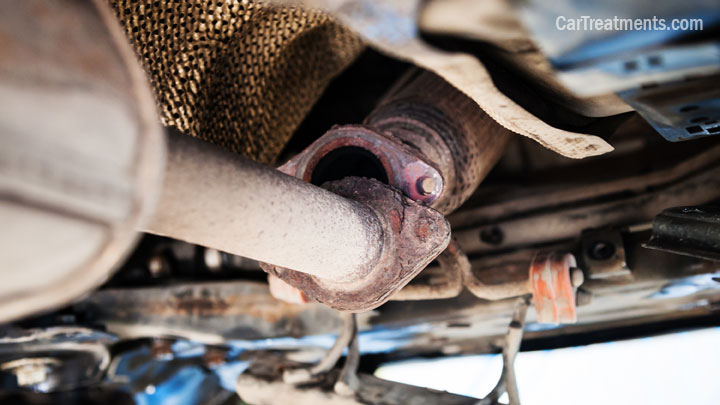5 Symptoms of an Exhaust Leak (You Shouldn’t Ignore)
Hearing annoying noises from under the car? Vibrating gas pedal? An exhaust leak could be the culprit. Exhaust leaks may allow harmful gases into the cabin while reducing engine performance and fuel economy.
In this article, we’ll cover five key symptoms of an exhaust leak and whether or not it’s safe to continue driving until you get the leak repaired.

Common Exhaust Leak Symptoms
Below five of the most common symptoms of leak in your exhaust system:
#1 – Noise That Gets Louder
When you start up the engine and hear an increasingly loud noise coming from around the engine, it is often the telltale symptom of an exhaust manifold gasket leak.
Remember that a gasket lies in between the piping of the exhaust manifold and the engine block. This gasket is constantly heated and cooled just like the piping.

So, if you don’t see a crack or leak coming from the piping, then check the gasket to see if there’s a flaw there.
See Also: 5 Ways to Make Your Exhaust LOUDER
#2 – Vibrating Gas Pedal

Anytime there is even a tiny leak, the car will vibrate. But if the leak is big, the vibrations will be bigger as well.
You will first begin to notice these vibrations coming from the gas pedal. If you don’t do anything about it, the vibrations will be felt on the steering wheel. Finally, the floorboards will vibrate.
#3 – Bad Fuel Efficiency

If you notice that your vehicle requires more gas than usual, then it could be due to a leaky exhaust system. These leaks make it harder for your engine to perform which, in turn, lowers your fuel efficiency.
Related: 15 Causes of Poor Fuel Economy
#4 – Unusual Noise When Accelerating

Place your foot onto the gas pedal and pay attention to any noises that don’t seem right. If you hear sounds that seem like air leaking out or even whistling, then you obviously have a problem.
However, it is hard for most people to tell the difference between different engine sounds, exhaust sounds, or even a vacuum hose leak. Not only that, but strange engine noises could be due to other kinds of engine problems as well.
Only use this sign if you’ve already experienced another symptom and are trying to verify your suspicions.
Read Also: Pros/Cons of a Resonator Delete
#5 – Unusual Odor

Not all exhaust fumes are odorless, just carbon monoxide. If you have a leaky exhaust manifold, you will notice a very strong odor inside or outside your vehicle. If the odor persists, then it is clearly harmful exhaust emissions that you don’t want to breathe in for very long.
Therefore, take your vehicle to an auto repair shop asap and have them verify the problem and then fix it. Make sure you drive with your windows open. Don’t take any chances with carbon monoxide because it can be lethal.
Read Also: What If Your Engine Oil Smells Like Gas?
Can You Drive With an Exhaust Leak?
While it’s possible, you should not continue driving your vehicle knowing it has an exhaust leak. While extra noise, vibrations, and poor gas mileage might just be annoyances, carbon monoxide is no joke.
You may think that you’re protected inside the car’s cabin from noxious exhaust fumes, but in reality, the inside is not airtight so carbon monoxide can slowly start seeping in but it has a hard time getting out.
See Also: Oil Coming Out of Your Exhaust? (What it Means)
Some exposure to exhaust fumes can cause headaches, fatigue, or dizziness which can easily cause an accident. Prolonged exposure to carbon monoxide can even lead to death.
If you feel like you’re experiencing any of the symptoms above (especially if you also smell exhaust fumes in the cabin), you should really take your car (with a window rolled down) to an auto repair or muffler shop right away.
Related: Does a Car Need a Muffler and Resonator?
Recap
The signs of an exhaust are often difficult to spot. If just one symptom comes up, that should be enough of a warning sign for you to get your car to a mechanic for repair.
Don’t wait for all these symptoms to happen together. Otherwise, you could be causing damage to your engine or exhaust system while also damaging the health of the vehicle’s occupants. Exhaust leaks are not something to be ignored.
- Replace the Engine or Replace the Car? (11 Factors to Consider) - Apr 11, 2024
- Plastic Piece Dragging Under Your Car? (What It Is and What To Do) - Mar 21, 2024
- Timing Belt vs Timing Chain (What’s the Difference?) - Feb 27, 2024

I have Toyota Avalon 2008. I feel vibration on my gas pedal and floorboard during acceleration. My engine mount are oem new. I took the car to muffler shops to test for leak. They always refuse to hang the car up, they will just check the car start up noise and said there is no leak.
Do you feel the vibration at any speed? Only when you accelerate? Do you feel the vibration when you accelerate hard and when you gently give it gas?
Check the CV joints and make sure the axle nuts are tight. Wouldn’t hurt to check other fasteners like the brake caliper bracket bolts while you’re in there.
Have a 2018 Nissan Sentra sv
Have had transmission replaced twice. Do they have to touch your manifold or anything close to the back of it?
If the engine came out to replace the transmission, yes; you have to disconnect the exhaust manifold to pull an engine.
a good friend had his car inspected last week and said the mechanic said he needed a front exhaust dual pipe. but his car passed emissions. he told him to come back and he would do the repairs with parts to correct the problem. for 700.00. does this sound right?
Possibly. Depends on the make and model of the vehicle, the cost of the exhaust system, and the extent of the damage.